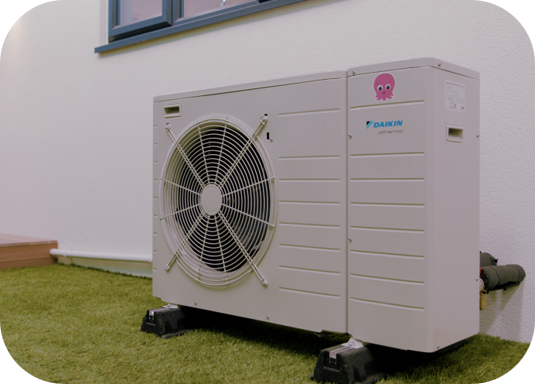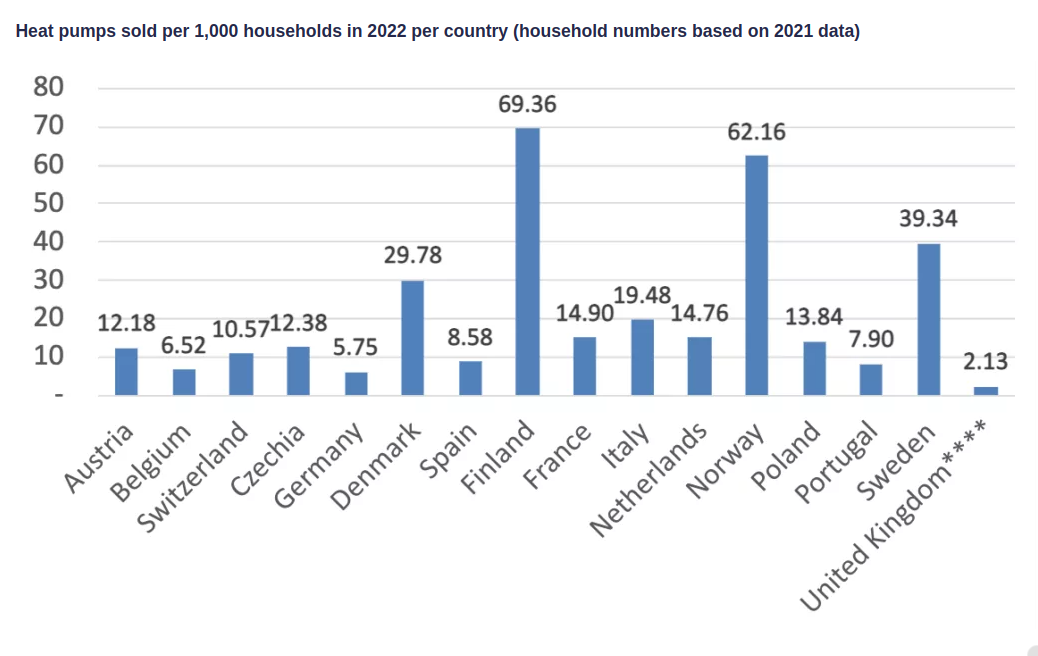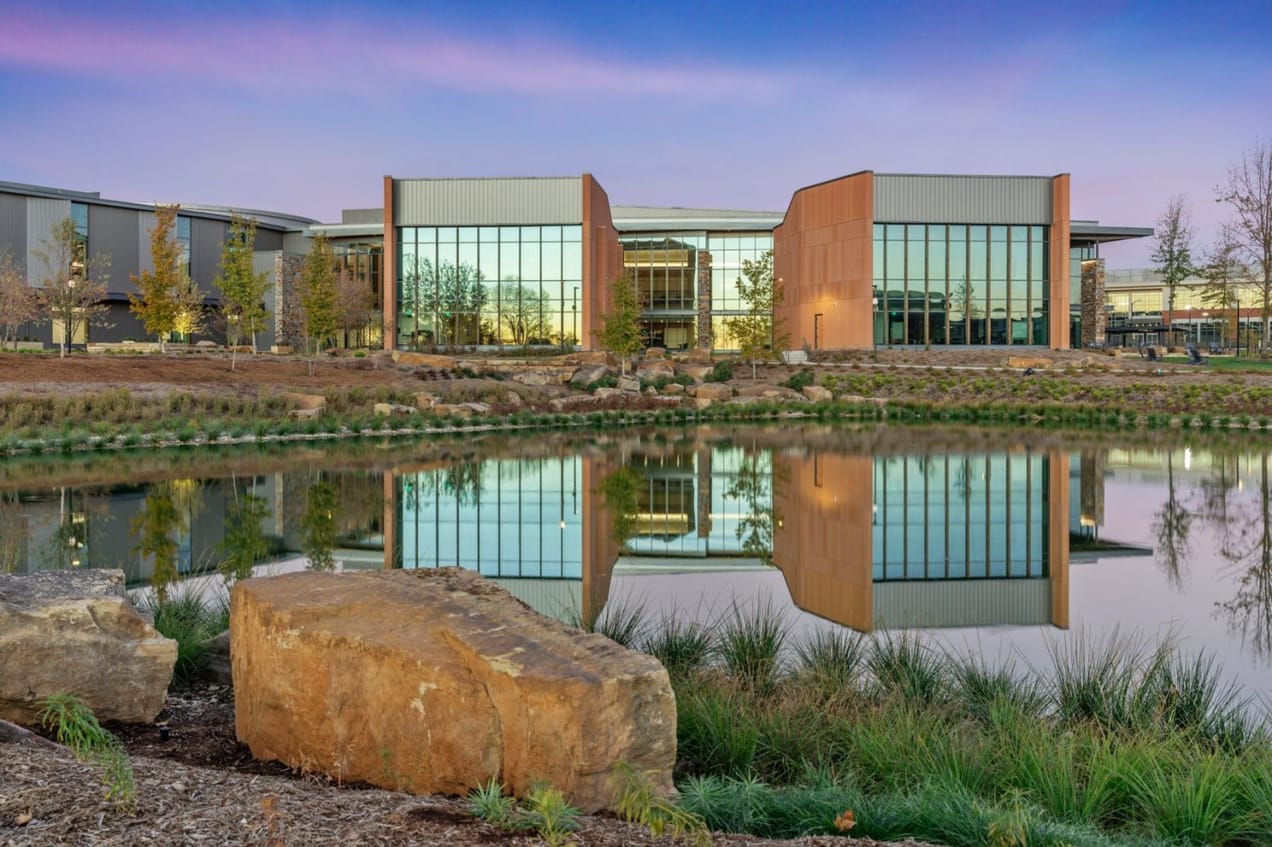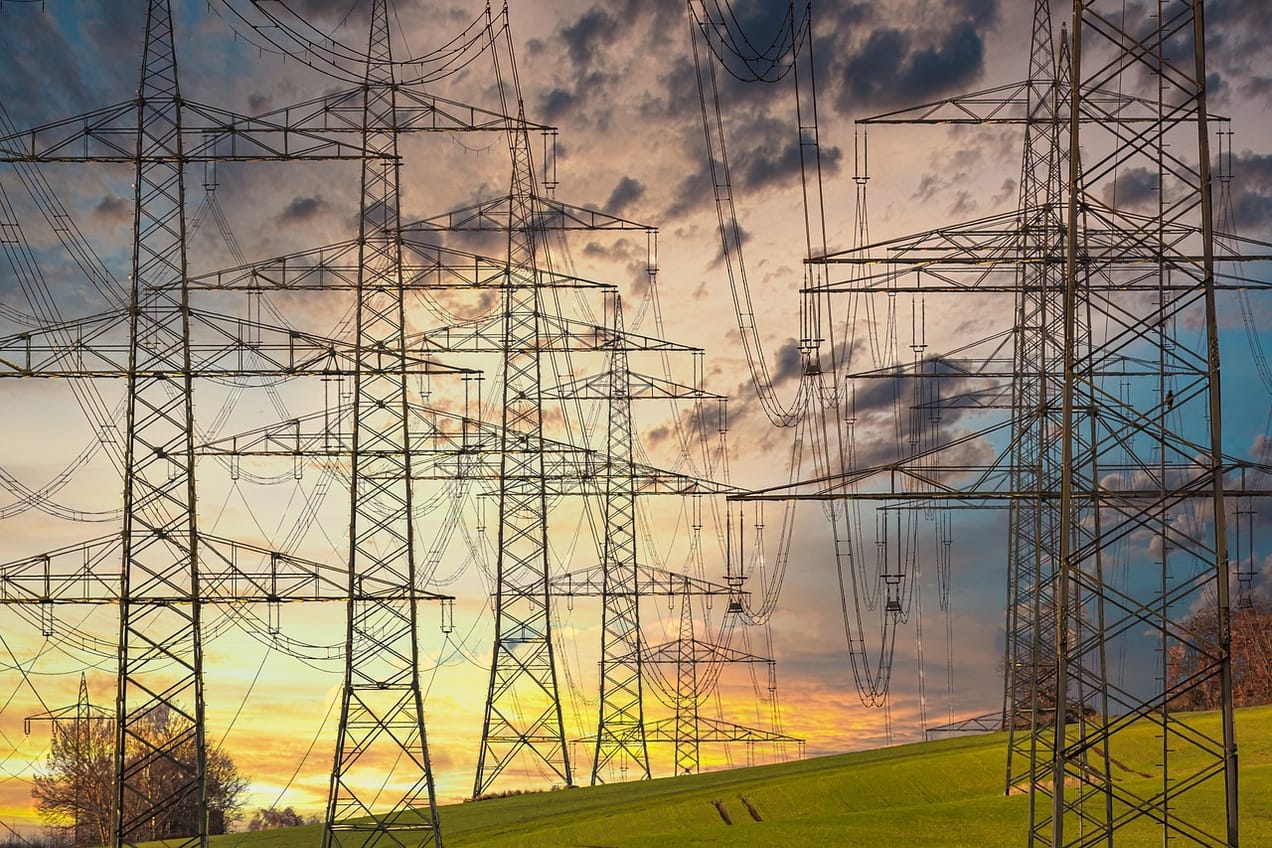
How do we pump up the volume on heat pumps?
Heat pumps could be an important low-carbon, cost efficient solution for keeping our homes at the appropriate temperature. Getting them into homes takes more than just the kit.
Summary: The UK has the lowest heat pump adoption per household across Europe. Whilst government climate policy highlights heat pumps as important, resources 'on the ground' do not match that ambition. A lack of appropriately qualified installers is a key concern as well as appropriate economic incentives for consumers on a lifetime cost basis, particularly with installation. Planning is a bottle neck too which should be reassessed holistically.
Why this is important: This highlights is the importance for any transition of appropriate implementation and having the right resources in place on the ground to make adoption economically viable and with as little disruption as possible for the end consumer especially.
The big theme: The built environment, encompassing residential and commercial buildings, communal areas such as parks, and supporting infrastructure such as energy networks, mobility, and water supply, is an important sustainability theme. It is an integral part of societal existence and a major resource consumption problem (40% of global raw materials) and decarbonisation problem (40% of energy-related GHG emissions) that needs investor, government, business and consumer attention. Around 3/4 of those energy-related GHG emissions are from the consumption of resources when the building or facility is in use - 'operational carbon'. These are activities enabling the building or structure to fulfil its function. The two main areas are 'powering activities' (enabling us to do stuff in those facilities like running a washing machine or running a computer) and 'thermal regulation' (keeping the environment at an appropriate temperature). Enabling low-carbon, cost efficient solutions can have significant impacts on our health, well-being and equity and inclusion, notably as climate change and climate-induced migration is steadily and significantly increasing the number of people exposed to extreme weather, including heat stress.

The details
Summary of a story from The BBC
A lack of qualified heat pump installers is preventing the UK from reaching its target of 600,000 annual installations by 2028, which could reduce carbon emissions by 500 million mt by 2030, according to the International Energy Agency. The UK Heat Pump Association have said at least 50,000 more installers are needed, whilst The Heating and Hot Water Industry Council believes that as many as 150,000 more installers are required. The government has launched a £500 ($640) grant to fund training in heat-pump installation. Companies, such as VitoEnergy and organisations such as Heat Geek, are now offering retraining to train more people to install heat pumps.
Why this is important
In many countries, heating homes has historically been through fossil fuels - in the UK predominately natural/fossil gas. Heat pumps essentially move heat rather than generating heat and need much less electricity than electric boilers. They have been a successful alternative in a number of countries, but have struggled to gain traction in the UK. What the BBC article highlights is the importance of appropriate implementation and having the right resources in place on the ground to make adoption economically viable and with as little disruption as possible for the end consumer especially. Without this, the UK government targets will not be met.
According to data from the European Heat Pump Association (EHPA), a record three million heat pump units were sold in 2022 in Europe overall, representing a rise of close to 38% year-over-year - and 2021 sales were up 34% on 2020! Heat pump sales in Czech Republic, Belgium and Poland doubled in 2022 (actually up by 120% in Poland) with more than 50% gains in six other countries. The introduction of the European Green Deal and the REPowerEU Plan have helped to drive this growth with local / national incentives stimulating demand. Leading heat pump company, Daikin, believes that by 2030, 70% of European homes will have a heat pump equating to around 14 million installed units.
The chart below shows 2022 in the context of households.

In Poland, more than 200,000 units were sold in 2022. In addition to the external pressures on energy prices brought on by the conflict in Ukraine, there were a number of policy measures that catalysed that growth. Poland's Clean Air Programme included grants for municipalities to switch to more environmentally-friendly heating sources and for improving energy efficiency in single-family residences (up to 70% of costs) plus PLN 53,000 per taxpayer in relief for 'thermomodernisation' works. As at the end of the year, 63% of the total number of applications for heat source replacement were heat pumps compared with 28% at the beginning of the year. Integration with the "My Electricity" programme also simplified the application process for households.
Finland which already has around 1.4 million heat pumps, providing roughly 20% of heating, still grew sales by 50% in 2022. From the turn of the new millennium, the Finnish government implemented a series of measures including tightening of new building energy efficiency requirements, to tax incentives including the ability to write off installation costs of heat pumps led to rapid growth in deployments from around 1,500 in 2000 to 930,000 by 2018 to the current 1.4 million. However, even here there is an acknowledgement of the critical importance of having the right support on the ground to ensure uptake.
"Shortages of human resources in the heat pump and refrigeration industries are threatening to slow down even the green transition, unless the education system is developed at all levels to meet today's needs"
Jussi Hirvonen, the executive director of the Finnish Heat Pump Association SULPU
You can see that the UK had the lowest heat pump sales in 2022 per 1,000 households, with EHPA estimates at just below 60,000 units sold during the year. This is concerning as it is less than 10% of the UK government's target of 600,000 annual heat pump installations run rate by 2028. As the article points out a shortfall in appropriately capable installers is a key problem as each installation requires careful measurement and adjustment to select the right size of heat pump, for example. The grants available in the UK at £5,000 per household for cost and installation of heat pumps often don't cover the costs of the units and installations. Checkatrade estimates that whilst supplying and installing a 5kW air-to-air heat pump costs on average £2,500, to supply and install an air-to-water heat pump can cost around £13,000. There may be additional costs for upgrading insulation or changing radiators too. Planning permissions are also often cited as problematic with requirements with, for example, "all parts of the air source heat pump [being] at least one metre from the property boundary."
The Regulatory Assistance Project, which is an independent, global, non-governmental advisory organisation, with offices in China, Belgium, Germany and the US, has produced a policy toolkit for mass heat pump deployment globally. At its core is a recognition of the need for coordination around communication around heat pump policy efforts and strategies considering three pillars aimed at creating a sustainable heat pump market:
- Pillar 1: economic and market-based instruments - lifetime costs should be cheaper than fossil-based alternatives, including relative costs of electricity with other fuels,
- Pillar 2: financial support - grants, tax rebates, loans and heat-as-a-service; and
- PIllar 3: regulations and standards - building codes and standards, planning and zoning.
Finally, some real life experience. Experienced corporate governance and responsible business board adviser and former PwC partner Tom Gosling sought to halve his family's carbon footprint over a seven year period to the end of 2026. This involved, amongst other things, reassessing how they heated their home. Tom started on the path of installing a heat pump for heating and hot water and documented his experience in an engaging blog. This quote summarises well:
"My experience installing a heat-pump shows the massive gap between climate policy and what happens on the ground."
Something a little more bespoke?
Get in touch if there is a particular topic you would like us to write on. Just for you.
Contact us
Please read: important legal stuff.

